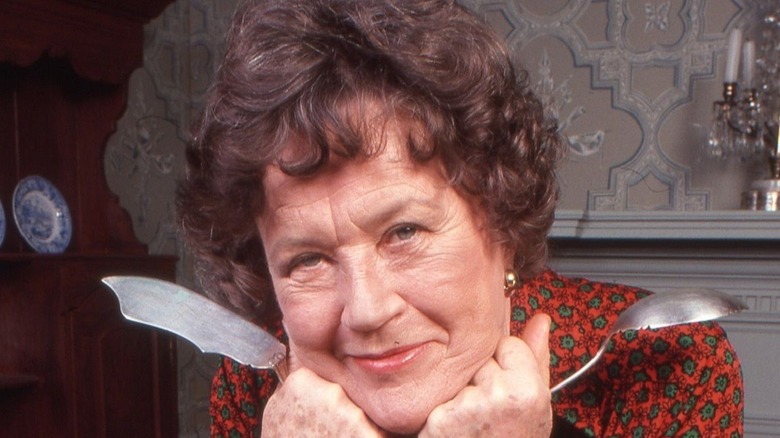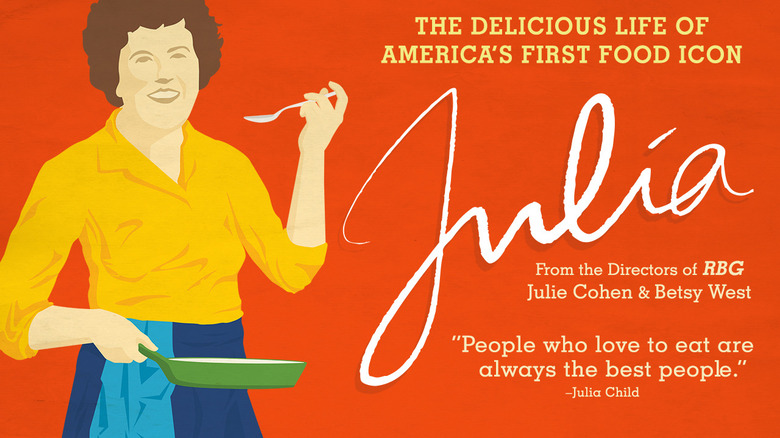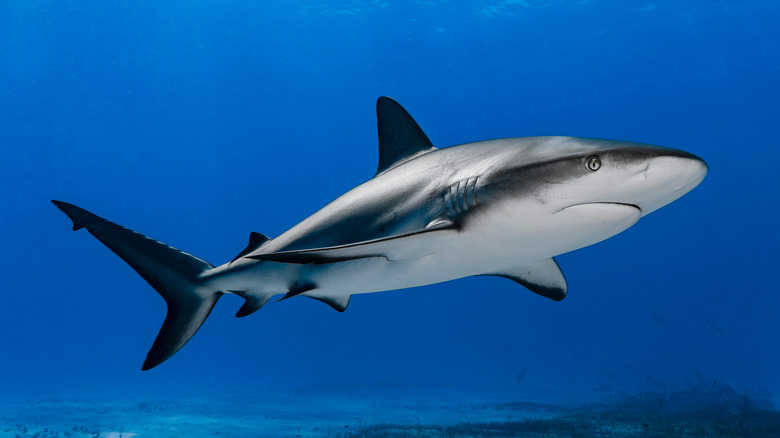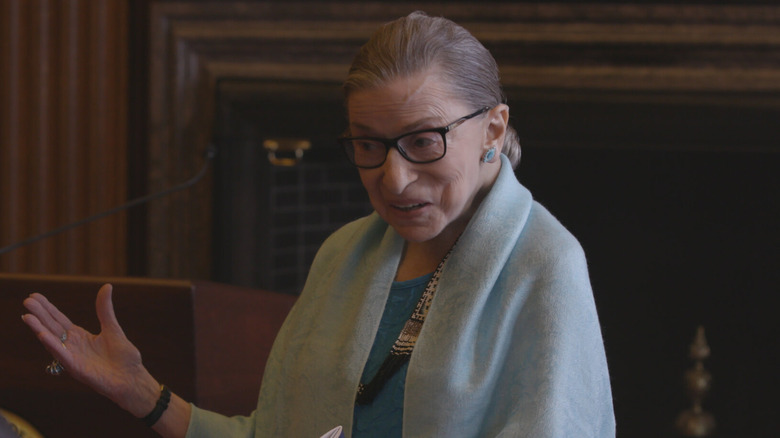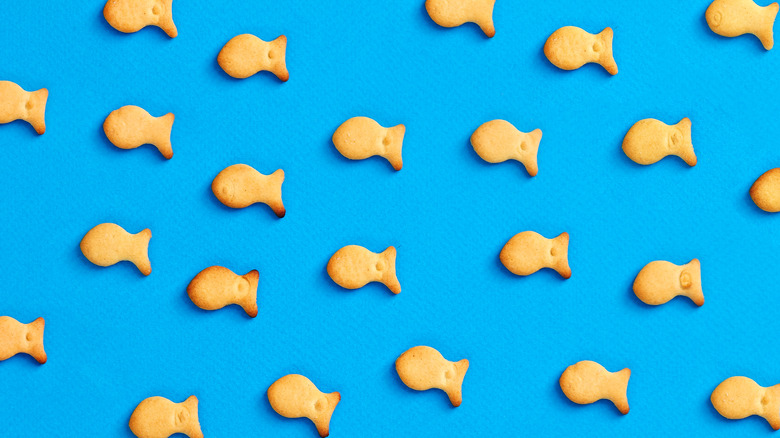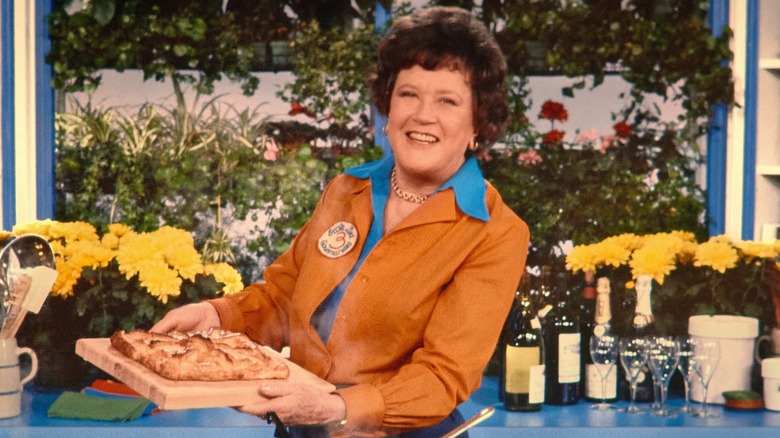Julia Directors Share Their Biggest Surprises While Making The Film - Exclusive Interview
What more could possibly be said about Julia Child? A lot, apparently. With their soon-to-be-released documentary "Julia," co-directors Julie Cohen and Betsy West present a deep dish dive into the life of the beloved icon, serving up an occasionally complicated yet immensely satisfying recipe for her massive success in the culinary arts and beyond.
While Child may be a pop culture fixture across multiple generations, "Julia" makes a compelling case that the entire spectrum of her accomplishments tends to be overlooked. Taking a similar approach to their exploration of the life of Ruth Bader Ginsburg (Cohen and West directed the 2018 hit documentary "RBG"), the duo traces Child's not-so-humble beginnings in Southern California to her travels to the Pacific during World War II (where she met her husband Paul Child) and subsequent French sojourn, which ultimately led to her groundbreaking work as a cookbook author, television personality, and all-around trailblazer for women. Child's efforts transformed how Americans approached food and paved the way for the rise of the celebrity chef for better or worse (mostly for better).
A mix of former co-workers, close confidants, and reverent chefs offer insight throughout the film and help to paint a complete vibrant picture of Child, flaws and all. (Though, spoiler alert: Don't expect any murder confessions or tawdry revelations.)
During an exclusive interview with Mashed, Cohen and West discussed what drew them to their subject in the first place, the delicious perks of working on the film, and several other facets of Julia Child that make her such a timeless treasure.
Why Julia Child is a "big deal"
Julia Child is generally viewed as an icon, but you were able to showcase the full breadth of her achievements. How did your perception of her change during the course of working on the film and what was the most interesting fact that you learned about her?
Julie Cohen: You know, I think our perception shifted as we went. I mean, we went into this project as Julia Child fans, but not really as Julia Child aficionados. So I think we had probably some of the same assumptions going in that some of our viewers will, which is that you sort of assume that this woman like, oh, well she must have been cooking from an early age and been a television star all along. And we didn't understand that she wasn't on television at all until she was already 50 years old. That was part of what we really loved about this story. We understood something of, kind of the cultural context because we grew up in the '60s. So we know that Americans' attitudes to towards food were not, I don't know what to say, were insufficient.
All the things that young people get today about how food can just be such a part, a joyous part of life and something to savor and kind of brag about to your friends, and like just nobody got that in the '60s. We were eating crappy, sucky food in this country and to just sort of step back and realize like, whoa, Julia Child is really responsible for changing that huge deficiency in our culture. She's a big deal and we wanted to bring her "big dealness" to an audience.
Can you talk about re-tracing Julia's culinary trail for the film? Do you have any fun food experiences to share from your travels? And did you come away with a favorite Julia Child recipe?
Betsy West: Yeah, well we had a great experience spending a week in France in the fall of 2019 in the beginning of October. And just going to La Couronne in Rouen, which is the place where Julia and Paul landed when they moved to France. And he took her there so that she could experience sole meunière, and that was Julia's awakening. So it was pretty fun to be there in the kitchen, watching the chef recreating that recipe and taking it out to the customers. And similarly, just going around Julia's haunts in France, to the Cordon Bleu, which is in a different building now than where she originally trained. But certainly, Julia is a big presence there. And the store where she got her copper pots, and just to be in France in general and absorbing Paris that she and Paul loved so much, that was a lot of fun.
How Julia Child helped develop shark repellent
Beyond her phenomenal culinary skills, Julia was such a natural in front of the camera. Did she have any comedians or television or movie stars that she looked up to or inspired her in that regard?
Julie: Yeah, that's interesting. I mean she was interested in theater. I don't know if she had a feeling about standup comedy. I mean, she was a natural ham and had been from childhood, according to family members that we spoke to. The thing that worked so well about Julia and why we think she played so well to an audience was she was really like suis generis. There was no one else like Julia. She was, when she went into that kitchen and started, she was bringing in the expertise that she had learned at Le Cordon Bleu and that she had learned from the 12 years working on writing "Mastering [the Art of French Cooking]" with her two French colleagues. But as far as the performative part of Julia, she was just being herself in this crazily natural, authentic way. And viewers responded.
You interviewed so many notable chefs and close confidantes. What was your favorite Julia Child story that didn't make it into the film?
Betsy: You know, there's some Julia Child moments that didn't make it into the film because there's so many of them. For example, the failures, like which one do we pick? I mean, we, for the film, we show how she tried to flip a potato pancake and that didn't go very well, it went all over the stove. But in fact, there was another cake that she made, a Charlotte cake, that came out and she said, [in Julia Child voice] "You know have to be very careful because this cake can collapse." And as she was saying that, like the whole thing just kind of fell down and ... [in Julia Child voice] "Well, that didn't work out." So there were a number of times, but there were only so many failures that we could show in the film. So that was, in some ways, we had a little bit of an embarrassment of riches from all that amazing archive.
Julie: Yeah. During the period that she was in the OSS, the precursor of the CIA, where, as we mentioned in the film, although there's a lot of people that like to spread a rumor that she was a spy, there is no evidence that she was a spy. Although she said she would've liked to be a spy. But during that period, she was involved in helping develop a shark repellent.
Betsy: Oh yeah.
Julie: There was some written material about that. Like, it's kind of a cute story, but it seemed a little bit off point. When we in the film, when we talk about her going off to Asia with the OSS for adventure, she's meeting Paul, and this is really sending us off on like the big romantic, epic journey. So that was the story we were telling. But the shark repellent was like a cute anecdote that just didn't fit in. And it is a true story. Because I remember when we saw it, we looked into like, is that really true? It seems a little weird. And then we did a little bit of research, enough to determine that it is in fact true, and yet it's not in our movie.
The many similarities and notable difference between Julia and RBG
On the subject of uncovering interesting tidbits about Julia Child, since you mentioned that you were both fans, is there some trepidation on your part that you might come across some sort of salacious skeleton from her closet? Is that something that worries you or entices you as a documentarian?
Betsy: I don't think it's either, frankly. I don't think we're worried about it or necessarily looking for it. What we are trying to do is get beyond the characterization of Julia Child and really figure out what makes this woman tick. Like who was she? How did she become the Julia Child that we all know? And we certainly did discover, I mean, biographers have written that Julia was in the 1970s, kind of homophobic, said some really insulting ... would talk about homosexuals and a very insulting way. And we didn't shy away from that. I mean, it turns out that that story actually, has a great evolution because Julia did a kind of 180 after her very close lawyer, Bob Johnson, who was a homosexual, who Julia just kind of was blind to the fact, like he would bring a girlfriend to parties and she would say, [in Julia Child voice] "When are they going to get married?"
And of course, everybody else knew. But Julia didn't quite know until he got AIDS. And then she not only supported him, but then she realized that this was a horrible crisis, that people were suffering. And she went out of her way to support a movement for drugs and healthcare and research for AIDS. And she did a benefit in Boston. And you know, this was really early on when people weren't, when celebrities weren't putting their reputations on the line to talk about AIDS. So that was kind of an evolution. We didn't shy away from it one way or the other. We just told the story and we thought it was a pretty good story.
You were both were involved with the film "RBG." I'm wondering what parallels can draw between Julia Child and Ruth Bader Ginsburg and also, in what ways were they different?
Julie: Yeah. I mean, well, first of all, given the subject matter, we have to start off by saying that Ruth Ginsburg by her own admission was an absolutely terrible cook. Hated cooking, her husband did all the cooking. That was mainly because her kids had thrown her out of the kitchen, because everything that she made was so bad that they could barely stand to eat it. So like obviously that's a big difference. And even like a little bit more seriously, RBG was proud of being a bad cook because she saw that sort of like as a badge of feminism, like I think she was thinking of coming from a generation where the woman doesn't want to get stuck in the kitchen. And so like some feminists, I mean, interestingly, Betsy and I, for various projects, have talked to Gloria Steinem who also is very proud of her lack of interest in cooking. She doesn't even really have a kitchen in her apartment because she eats out.
So Julia obviously is different in that way. But these are groundbreaking women who set out new paths in areas in our culture where women hadn't previously been accepted or welcome. And in addition, women who achieved what they achieved through a lot of hard work and a good deal of confidence, and who had a supportive feminist husband helping in their endeavors throughout their careers, which plays a substantial role in the success of both of these remarkable women.
Why Julia Child served Goldfish at her dinner parties
Julia's obviously famous for classical traditional French cooking. Did she have any sort of unusual food vices, like Big Macs or Doritos?
Betsy: Oh yeah. She wasn't a food snob. I mean she was an expert in cooking French, but she loved a good hamburger. We love the scene in the film with her and Jacques Pepin in a later show that they did together, and they clearly just made an amazing hamburger and they both bite into their hamburgers with gusto. I mean, the question would be asked if people would be afraid to invite Julia Child for dinner. She's like, [in Julia Child voice] "No, just get me a good hamburger, a good steak and I'll be fine." You know, she wasn't a snob about it. And she also liked to serve ... I mean, she would make very elaborate dinners, but for hors d'oeuvres, I think because she didn't want to ruin people's appetite with fancy hors d'oeuvres, she would often just serve Goldfish.
Julie: Just crackers.
Betsy: That was her hors d'oeuvre of choice.
You mentioned her time in China, which was obviously extremely significant because that's where she met her husband. Did her time there at all shape her culinary experience and have any impact on her cooking?
Betsy: Oh Yeah.
Julie: Absolutely. I mean, China was the first place where Julia was introduced to food as an exciting part of culture. You know, this was when she and Paul were just dating, before they were married, and they would venture out of the quarters where most of the Americans were hanging out to have authentic Chinese food. And she was really just kind of besotted by that whole experience.
We represented a little bit in the film because we had some great audio of her talking about what it felt like to just be mesmerized by this incredible food. It was an experience that was kind of paralleled later when right after they did get married and they moved to Paris because Paul is working for the State Department, that's when she decides, "I'm going to make food my main thing. That's how I'm going to spend my time is learning to cook." But that door had sort of started to open in China where it was the first time that she really had food that seemed really prepared with a great deal of care and that so, yes, Chinese food had a huge impact on her and she loved it into her later life as well.
Did you come across any instances where she actually prepared Asian food or showcased any Asian recipes in her repertoire?
Betsy: I'm not sure. I mean, she may have because she did branch out, but I really, I don't remember.
Julie: Yeah I can't remember an episode where she's preparing.
Betsy: I think she was going to a pretty well-known Chinese restaurant in Boston that she would like to go to, but I don't know about her actually preparing Chinese food. I just don't know.
The reason Julia Child didn't edit her mistakes
Julia was around during the rise of the celebrity chef, and the Food Network explosion. Was she aware of the fact that she helped usher in this whole shift in the zeitgeist?
Betsy: Yeah, I think that it had just started, kind of in the Nineties. And the Food Network. I can't remember exactly when the Food Network started. I mean, I think she didn't like food as a stunt. She took cooking seriously in some ways. I mean, she wasn't a snob and she wasn't stuck up about it, but she did think it was important to learn how to cook right, and to prepare things carefully. And so I'm not sure that she took to crazy competitions or the more extremes of that. But I think she did like the fact that there was a food community growing and she supported chefs when she moved back to California at the end of her life. I mean, she was part of a food movement and she would go back into the kitchens and talk to the chefs and she was part of an association and supported California wine. I mean she saw herself as, in a way, probably the Grand Dame of that community.
Julie: Right.
Julia had, and continues to have, an amazing ability to transcend generations. What is it specifically that makes her such a unique and extraordinary individual in the food world?
Julie: I think the just very obvious exuberance and joie de vivre that she's bringing to everything she does. She just really hits people. And you don't have to share her generation to feel that spirit and to get that it's really authentic, that you're really seeing the real Julia and that kind of realness is you can't fake authenticity. And it's not that common. And so even to the point where as she's cooking in her show and she's messing stuff up, like people love the mistakes. She was sort of loving the mistakes, but like there was actually a lot of, sort of larger life lessons that are coming from out of that. Like, "Oh, I'm going to flip this and I've totally screwed it up. And I'm going to figure out how to make the best of that. And I'm going to be completely unfazed in how I continue talking through it like that." That's just something that people can connect to over a lot of generations, particularly women who are used to feeling like they need to feel really bad about when you mess up.
"Julia" launches in Los Angeles and New York on November 12 followed by a nationwide rollout.
